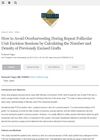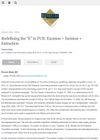August 2022 in “Biomedicines” Turning off the Lhx2 gene in mouse embryos leads to slower wound healing and scars.
 67 citations,
May 2014 in “International Journal of Molecular Sciences”
67 citations,
May 2014 in “International Journal of Molecular Sciences” Using your own skin cells can help repair aging skin and promote hair growth.
35 citations,
December 2020 in “International Journal of Molecular Sciences” Mast cells likely promote skin scarring and fibrosis, but their exact role is still unclear.
 8 citations,
October 2022 in “Regenerative Therapy”
8 citations,
October 2022 in “Regenerative Therapy” New regenerative treatments for hair loss show promise but need more research for confirmation.
 7 citations,
June 2022 in “Frontiers in Medicine”
7 citations,
June 2022 in “Frontiers in Medicine” ADSC-derived extracellular vesicles show promise for skin and hair regeneration and wound healing.
 7 citations,
December 2018 in “Discoveries”
7 citations,
December 2018 in “Discoveries” Platelet-rich plasma may improve wound healing by stimulating cell growth and blood vessel formation.
 3 citations,
October 2023 in “Military Medical Research/Military medical research”
3 citations,
October 2023 in “Military Medical Research/Military medical research” Regulatory T cells help heal skin and grow hair, and their absence can lead to healing issues and hair loss.
3 citations,
November 2022 in “International journal of molecular sciences” Bio-pulsed stimulation increases production of beneficial vesicles from bird stem cells that improve skin and hair cell functions.
 1 citations,
September 2023 in “Journal of cosmetic dermatology”
1 citations,
September 2023 in “Journal of cosmetic dermatology” Autologous FUE hair transplantation is effective and safe for treating hair loss due to scarring from infections.
 1 citations,
October 2021 in “Cosmoderma”
1 citations,
October 2021 in “Cosmoderma” Hair transplants can work for permanent hair loss if the condition is stable and done carefully.
 August 2024 in “Clinical Cosmetic and Investigational Dermatology”
August 2024 in “Clinical Cosmetic and Investigational Dermatology” Enzyme injections can effectively treat epidermoid cysts without surgery.
April 2024 in “International journal of molecular sciences” Combination pharmacotherapy is generally more effective for treating keloids and hypertrophic scars.
 January 2024 in “Cosmetics”
January 2024 in “Cosmetics” HAIR & SCALP COMPLEX may help treat hair loss by stimulating hair growth and restarting the hair cycle.
 August 2023 in “Journal of analytical & pharmaceutical research”
August 2023 in “Journal of analytical & pharmaceutical research” Microneedle-assisted therapy with human basic fibroblast growth factor significantly regrew hair in patients with hair loss.
 July 2018 in “Hair transplant forum international”
July 2018 in “Hair transplant forum international” To prevent thinning in the donor area, harvest less than 50% of the original hair density in repeat hair transplants.
January 2023 in “International Journal of Molecular Sciences” November 2022 in “Frontiers in Medicine” PRP shows promise for treating mild alopecia areata but needs more research for cicatricial alopecias.
38 citations,
January 2017 in “PPAR Research” PPAR-γ helps control skin oil glands and inflammation, and its disruption can cause hair loss diseases.
 25 citations,
December 2021 in “Stem Cell Research & Therapy”
25 citations,
December 2021 in “Stem Cell Research & Therapy” MSCs and their exosomes may speed up skin wound healing but need more research for consistent use.
 15 citations,
January 2021 in “Journal of Materials Chemistry B”
15 citations,
January 2021 in “Journal of Materials Chemistry B” Silk nanofiber hydrogels help stem cells heal wounds faster and improve skin regeneration.
6 citations,
May 2023 in “International journal of molecular sciences” Collagen-enhanced mesenchymal stem cells significantly improve skin wound healing.
 5 citations,
November 2021 in “Skin appendage disorders”
5 citations,
November 2021 in “Skin appendage disorders” Hair loss can cause stress and mental health issues, so treatments should address both the physical and psychological aspects, involving a team of dermatologists, psychologists, and hair specialists.
 4 citations,
January 2018 in “Hair transplant forum international”
4 citations,
January 2018 in “Hair transplant forum international” The document suggests changing "Follicular Unit Extraction" to "Follicular Unit Excision" to more accurately describe the surgical hair transplant procedure.
 1 citations,
August 2023 in “Military Medical Research”
1 citations,
August 2023 in “Military Medical Research” Smart hydrogel dressings could improve diabetic wound healing by adjusting to wound conditions and controlling drug release.
 1 citations,
August 2023 in “The Journal of Pathology”
1 citations,
August 2023 in “The Journal of Pathology” Different types of skin fibroblasts have unique roles in skin health and disease.
1 citations,
June 2023 in “Medicina” People with Epidermolysis bullosa have many health problems including poor oral health, which is often neglected due to other medical issues.
1 citations,
January 2023 in “Science Advances” The skin's microbiome helps hair regrow by boosting certain cell signals and metabolism.
 February 2024 in “Skin health and disease”
February 2024 in “Skin health and disease” Many popular skincare products claim to prevent aging but lack strong evidence to prove their effectiveness and safety.
 January 2021 in “Springer eBooks”
January 2021 in “Springer eBooks” Different rheumatological diseases can cause specific skin problems.
122 citations,
April 2020 in “American Journal Of Pathology” Skin aging is a complex process influenced by various factors, leading to wrinkles and sagging, and should be considered a disease due to its health impacts.


















